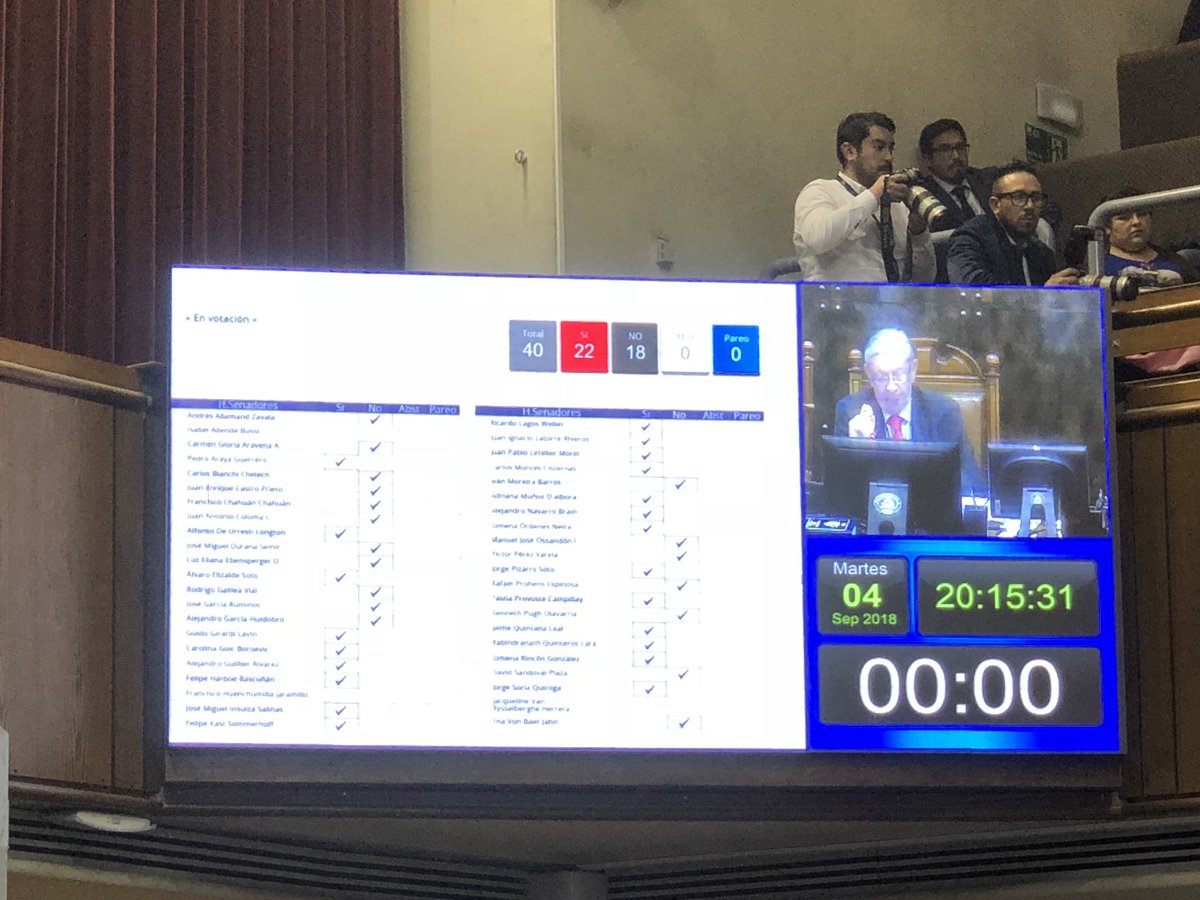On Wednesday the Senate approved an initiative put forward by the government to allow adults over 18 to change their name and sex on the civil register, joining a handful of countries on the continent where this is legal.
Each law needs a minimum of 25 votes to be passed, and this one scraped through with 26 votes for and 14 against, reported La Tercera. The Senate also approved the same proposal for adolescents from 14 to 18 years old, with the condition that they have the approval of at least one family member or legal guardian and a family tribunal allows the process.
Aprobado #LIG para realizar el cambio registral a menores de 18 años y mayores d 14.Hemos dado un gran paso para lograr una sociedad mas inclusiva @SenadoresPPD @OTDChile @Movilh @acciongay @IgualesChile @MilesChile @TransexCoquimbo @DiversidadPPD @marcelo_aguilar @ZulianaAraya pic.twitter.com/2xi6Ihz5Gj
— Adriana Muñoz D’Albo (@_adrianamunoz) 4 de septiembre de 2018
However, controversy had been brewing around the proposal due to the possible inclusion of children younger than 14. There was a separate vote to decide whether these children would be able to legally change their name and sex, but the bill failed to attain the required number of votes, with just 22 for and 18 against, without the elusive 25 votes necessary to be approved.
Among those who were strongly against the law being extended to under-14s, MP for UDI (Independent Democratic Union), Iván Moreira stated that the proposal was “abhorrent” and “an attack against Chile’s families.” José García from the RD (Democratic Revolution) agreed that it “would cause a lot of damage to Chilean families.”
Por eso Voté que NO!!! pic.twitter.com/dM5UFMTk4C
— Ivan Moreira Barros (@ivanmoreirab) 5 de septiembre de 2018
However, Felipe Kast from Evópoli retorted that “there is nothing abhorrent about being trans,” and RD Senator Juan Ignacio Latorre lamented that “leaving children out of the law is abandoning them.”
Hernán Larraín of the IDU is in favour of the law being extended to children and spoke to the Senate in an attempt to persuade those present to move beyond their traditional convictions and see that trans people exist and have the same rights as others.
“We think that this is a fair solution, that resolves a problem with realistic criteria, always thinking of what is best for the children,” he said in front of the Senate. “It would be unfortunate that in Chile we are not able to recognise this reality beyond religious or ideological convictions.”
BioBioChile reported that PPD (Party for Democracy) Senator Adriana Muñoz also urged the Senate to contemplate the proposal separately from their religious or ideological beliefs.
“We are not taking charge of dogmas, ideologies, faith or religion,” she said. “We are discussing the situation of thousands of our compatriots who are living a different reality. This is not an invention of “gender ideology,” it is a current reality. I don’t think that there is a god who would abhor the difference.”
Outside the Senate, hundreds of people gathered in support of both the passing and the vetoing of the bill. The demonstrations remained peaceful, potentially due to police keeping the opposing groups a couple of blocks away from each other.
BioBioChile reported that the majority of those protesting against the approval of the law had ties with evangelical churches. Famous for his controversial anti-LGBT statements, evangelical priest Javier Soto called all Christians to cut ties with the political classes.
“With these advances of the Civil Union, abortion and gender identity, we are in a position to call to the Evangelical Church to break any alliance with politics,” he said. “Whatever side they’re on.”
The Pañuelos Rosados (Pink Handkerchief) group are against the gender identity law applying to anybody under the age of 18.
“For underage children those who have to decide are us, the parents,” spokesperson Ingrid Bohn told Emol. “But we say, and lets make it clear, that we don’t want children to change their sex on the civil registry, not any underage person. Today being overage is 18 or older, if now a minor can change their sex, then they can also go to a club, or drive, or drink alcohol and smoke.”
Encuesta Identidad, a survey carried out by LGBTI+ rights group Movilh on transgender people show that trans individuals are aware that the sex assigned to them at birth was not the one they identified with at a very early age. Of those surveyed, 85.5% were aware of this before the age of 15, with 19.2% realising before they were five years old, 39.4% between five and 11, and the remaining 29.9% between 11 and 15.
#LeydeIdentidadDeGenero AHORA!! Los niños y niñas trans deben tener derecho a cambiar su nombre y sexo legal. Estos datos de Encuesta Identidad 2018 lo demuestran | @Movilh https://t.co/WMyYJ5dqD7
— Voluntari@s Movilh ?️? (@Marcha_Movilh) 6 de agosto de 2018
The survey also showed that 52% of trans individuals have self-harmed in some way, with the majority of those surveyed carrying out these actions between the ages of 5 and 15.
Although the law to change sex legally on the civil register from the age of 14 was approved in the Senate, this week the proposal will be seen by the Chamber, after which it will be sent to President Sebastián Piñera. Piñera will then have 30 days to approve or reject the proposal before it finally becomes a law, after five years of campaigning for the legislation.







